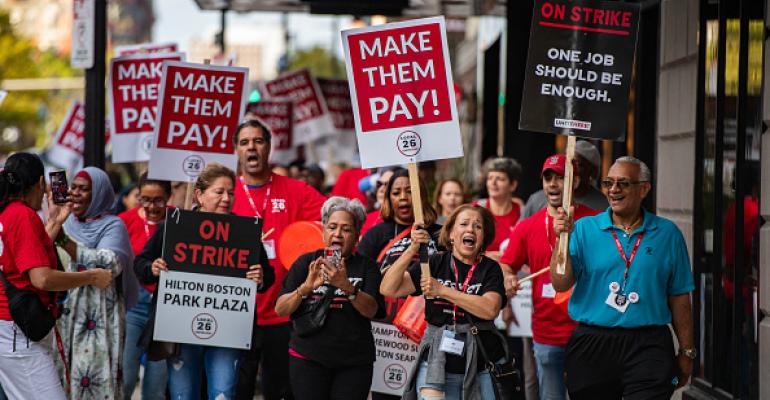Multi-year contracts with labor union Unite Here have expired at hotels across the country, and repercussions are starting to be felt. At least 10,000 unionized hotel employees—housekeepers, front-desk clerks, kitchen and restaurant staffers, bartenders, and bellhops—stayed home from their jobs between August 29 and September 3.
First, more than 700 employees at the Virgin Las Vegas stood outside the hotel on August 29 to chant and picket in support of a new five-year contract. The workers had also walked out for 48 hours in mid-May to protest not having a new contract.
Next, 48-hour work stoppages took place between September 1 and September 3 at various Hyatt, Hilton, and Marriott hotels in Baltimore; Boston; Greenwich, Conn.; Honolulu; Kauai; San Diego; San Francisco; San Jose, Calif., and Seattle.
And these short-term strikes may not be the last in those cities if negotiations between hotels and the Unite Here local chapters do not produce an agreement soon. According to this CNN article, Unite Here has yet to determine whether work stoppages will return on a rolling basis, as happened across dozens of hotels in Southern California in 2023.
What’s more, Unite Here is threatening to expand the strike in the coming days to as many as 65 hotels in 13 different cities, with properties in New Haven, Conn.; Oakland, Calif.; and Providence, R.I., potentially joining the action.
In the CNN article, Hilton and Hyatt said they will continue to serve customers during any work stoppages as they continue to negotiate with each city’s chapter of Unite Here.
Navigating Labor Stoppages: Tips for Planners
Events-industry attorney Joshua L. Grimes, Esq., of Grimes Law Office in Philadelphia, told MeetingsNet during a prior labor stoppage that “for meetings coming up soon, it’s appropriate to ask the host facility specifically how they intend to handle [staffing] if union members strike” over the dates of a meeting. Planners could ask the property to sign a service guarantee containing financial remedies in the case of nonperformance, including compromised event quality.
Also, “I’d say it's reasonable to ask the in-house catering company for a detailed backup plan,” said Grimes. “And if a group does not have confidence in what it hears, it could demand the right to bring in its own caterer” or to use other options such as food trucks.
Lastly, “due diligence requires that a group not wait until a few days before the event to start asking questions,” Grimes added. “There's a legal doctrine called ‘anticipatory breach’ that says a group may not need to wait until the last minute to see if service can be provided at an acceptable level of quality.” If it’s clear that a hotel won't be able to perform its contractual obligations, the group might be able to cancel the contract before the event starts.
Don't miss a thing: Sign up for our e-newsletters HERE.
And join the industry conversation: Connect with us on LinkedIn!





